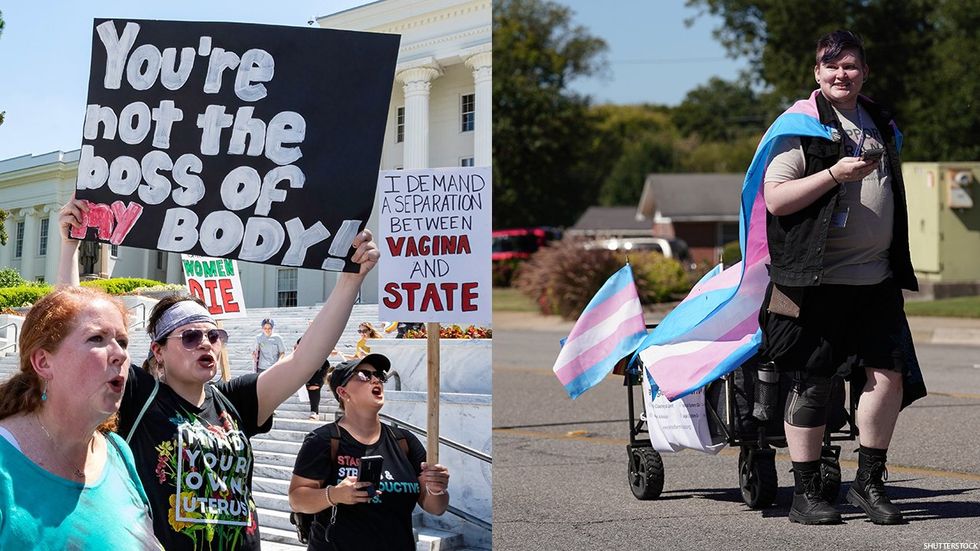A federal appeals court has lifted a block on most of the provisions of Alabama’s ban on gender-affirming care for transgender youth, citing the anti-abortion Dobbs Supreme Court ruling in doing so.
This means Alabama can enforce anti-trans law, which made it a felony to provide this care to trans minors, while a lawsuit against it proceeds.
A three-judge panel of the U.S. Court of Appeals for the 11th Circuit issued the unanimous ruling Monday. The three judges — Barbara Lagoa, Andrew Brasher, and J.P. Boulee — were all appointed by Donald Trump. Boulee is a judge on a lower court, but he participated in the 11th Circuit case under a process by which judges can be temporarily designated to serve on appellate courts.
The Alabama law took effect early in May 2022. Shortly thereafter, U.S. District Judge Liles Burke issued a temporary injunction blocking the provisions that ban the administration of hormones and puberty blockers to minors for the purpose of gender transition. The ruling came in a case brought by two doctors and families with trans children, who said the law violated various constitutional rights, including the right to due process of law. Burke found that the plaintiffs were likely to succeed on most of their claims at trial and that there was a threat of imminent harm to trans youth if those parts of the law were enforced.
He left intact the provision banning gender-affirming surgeries, which are not taking place in the state, and one requiring school staffers to notify parents if a student comes out as trans. Violation of the law carries a prison term of up to 10 years and a fine of up to $15,000.
But Burke used the wrong legal standard in issuing the injunction, the 11th Circuit panel asserted. “The plaintiffs have not presented any authority that supports the existence of a constitutional right to ‘treat [one’s] children with transitioning medications subject to medically accepted standards,’” the ruling states.
They cited Dobbs v. Jackson Women’s Health Organization, in which the Supreme Court last year overturned Roe v. Wade and its national guarantee of abortion rights. In Dobbs, the high court found that when determining if a right is a substantive one guaranteed by the due process clause, courts decide if it is “deeply rooted in [our] history and tradition” and “essential to our Nation’s ‘scheme of ordered liberty.’”
The 11th Circuit ruling quoted those passages and asserted that “the use of these medications in general — let alone for children — almost certainly is not ‘deeply rooted’ in our nation’s history and tradition. Although there are records of transgender or otherwise gender nonconforming individuals from various points in history, the earliest recorded uses of puberty blocking medication and cross-sex hormone treatment for purposes of treating the discordance between an individual’s biological sex and sense of gender identity did not occur until well into the twentieth century.” The ruling also said that the Alabama law does not amount to discrimination based on sex or transgender status and is therefore subject only to the lowest level of constitutional review.
The Alabama attorney general had cited the Dobbs ruling in arguing for the injunction to be lifted. This one of several instances in which right-wing attorneys had invoked Dobbs in seeking to undermine other bodily autonomy rights.
That argument hadn’t succeeded until July, when U.S. Court of Appeals for the Sixth Circuit cited Dobbs in letting Tennessee’s gender-affirming care ban take effect. Shortly afterward, the Sixth Circuit did the same in a case involving Kentucky’s ban.
Attorneys defending the right to gender-affirming care have noted that their opponents were frequently using Dobbs, but some are skeptical that this strategy will succeed in the long run.
The plaintiffs in this Alabama case, one of two filed against the ban, are represented by the Southern Poverty Law Center, GLBTQ Legal Advocates and Defenders, the National Center for Lesbian Rights, and the Human Rights Campaign with King & Spalding LLP and Lightfoot, Franklin & White LLC.
The attorneys issued this statement:
This is a deeply disappointing decision that is difficult to reconcile with the 11th Circuit’s prior rulings and with the Supreme Court’s clear guidance that discrimination because a person is transgender is sex discrimination. Our clients are devastated by this decision, which leaves them vulnerable to what the district court — after hearing several days of testimony from parents, doctors, and experts — found to be irreparable harm as a result of losing the medical care they have been receiving and that has enabled them to thrive.
While this is a setback, we are confident that it is only a temporary one. Every federal district court that has heard the evidence presented in these cases has come to the same conclusion: these medical treatments are safe, effective, and lifesaving for some youth, and there is no legitimate reason to ban them. We believe that at the end of the day, our nation’s courts will protect these vulnerable youth and block these harmful laws, which serve no purpose other than to prevent parents from obtaining the medical care their children need. Parents, not the government, are best situated to make these medical decisions for their children. These laws are a shocking example of government overreach and a jarring intrusion into private family decisions. This case is far from over, and we will continue to aggressively seek legal protection for these families.














































































